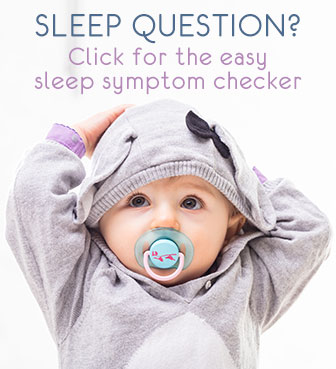Avoid sleeping problems through baby separation anxiety
Author Name: Heidi Holvoet, PhD
Medical fact-check: Dr Leah Alexander, M.D., F.A.A.P.
Baby separation anxiety
is
an
often unrecognized cause of disturbed sleep.
Your baby or toddler refuses to settle at night or for
naps, stops
sleeping
through the night, often wakes up crying, can't self-soothe anymore, etc.
Fortunately you can
prevent
sleep
problems
at night during separation anxiety phases with a
few simple ideas and techniques, right below. But first a quick look at what it is and how to spot it.
What is baby separation anxiety?

Baby separation anxiety is
when
your little one fears never to see you again
after you leave
.
This can be when you leave your baby with
another carer but just as much when you go from one room to
the other in your home.
Or
when they wake up at
night and you're not there.
Observing your baby or toddler's separation anxiety may be heartbreaking but it's
actually
an important development phase
. It is how they learn to be an
independent person.
It
usually starts around 4 to 6 months and peaks at about 1 to 1,5 years
old for many. Still, some babies will show few (clear) separation anxiety signs past 12 months and
others go through review phases at the age of 2-3. All part of their individual journey to being a confident resilient child.
First, as a newborn, your infant knows no better than they'll never be
separated from you. On the other hand, at this age, they just don't
remember that you exist when you walk out of the room.
At
about 4 to 6 months, your baby learns that you and they are different beings
and they also remember you, even if they don't see you. However, they
don't have a sense of time
nor the experience to know that you'll be back soon
. Your baby thinks it's forever :/
Feeling anxious about not having the security of your presence is only
natural then.
Needless to say that
baby
separation
anxiety at bedtime
can make it harder to settle, or to self-soothe when waking at night.
How to recognize baby separation anxiety
The first step to help your baby through this phase successfully is to recognize and acknowledge the separation anxiety and the legit fear it brings. Acknowledging the fear will help your little one overcome it.

You
may not notice at first, and wonder why your baby even if you leave
the room for just two minutes. Something they didn't seem to care about
before.
Or if they're in granny's arms, which they enjoy so much, and you take a
few steps out of sight.
Or if your baby doesn't sleep through the night anymore but frequently wakes
at
night, upset.
Don't think that your little one is spoiled and tries to get your attention to
trick
you.
The fear is
real and legit. Comforting and reassuring
without dramatizing is the best help you can offer.
9 months old is a typical age when many parents notice a bout of separation anxiety but it can start sooner, and recur at different developmental stages.
How to avoid sleep problems due to separation anxiety
The
first thing we all need to sleep well, is the knowledge that we are
safe and secure. Your goal when dealing with separation
anxiety is to
grow your baby's confidence
in being separated from you. Namely that you'll be back.
Here's what you can do:
-
Play peek-a-boo and hide-and-seek
From a couple of months old, start playing peek-a-boo games regularly: hide your face and then re-appear, very very likely your baby will giggle in delight!
Gradually hide your face for a bit longer each time. Also hide underneath the table, or behind a door. Watch your little one to see how far you can go.
Or it can be your baby hiding from you. I've yet to meet a kiddie who doesn't adore this game!
Play these games frequently: by seeing you re-appear each time, your baby or toddler learns that you will be back even if they don't see you all the time.
Also add the Yo-Yo game from my Play2Sleep series (free download) to your daily play time: it's a super fun and super effective confidence booster. -
Talk about what you will do
Babies understand a lot more of what we say than we realize.
Therefore, it is a good idea to tell them what you will do while they sleeps.
Show your baby where in the living room you'll be reading a book, where in your office you'll be at the computer, or in which part of the house you'll be doing chores.
Also, if your little one does not sleep in your room, it is a good idea to make a visit to your bedroom part of the bedtime routine . Knowing where you will be at night may be all the reassurance your baby needs when waking up. -
Don't dramatize
As heartbreaking as it may be, do not cry along. If your baby/toddler sees that you are confident and that it is not a big deal, that trust will grow in them too.
However, if you cry with them, they'll that that it really is a bad thing if you're not together all the time.
For bedtime this means: go through the bedtime routine as usual, and leave the room just as confidently as usual. Of course, comfort and reassure when necessary, but don't hesitate (you may need to 'fake' it till you can make it for a little bit, even the simple act of walking upright and taking a slow deep breath, can be enough). -
Share
tasks with your partner of another carer
If possible, it's always a good idea to vary who takes your baby or toddler to bed. This will help your baby get used to not being with the same person all the time .
If you breastfeed or if it just works out that way, you may naturally grow into the only person that brings your baby to bed. By the time you stop nursing and want to have someone else put your baby to bed, the separation anxiety might be at a peak moment.
You can wait for the worst of the anxiety to pass.
Alternatively, gradually get your baby used to others taking them to bed by doing it together at first, taking turns, etc.
-
Keep
your promises
This is a tiny but powerful trick, most useful for an older infant of one or towards two years old.
When putting your baby or toddler to bed, and they feel unsure, tell them that you will come back to check on them soon.
And then do go back, but very quickly, let's say within two minutes (but for some babies, at first, this may need to be 2 seconds - and that's fine because you'll build it up). This way your little one learns that you do come back when you say so, and quickly .
Doing this consistently for a while can be enough to reassure them and you may soon find your baby asleep by the time you go back.
Or would it be ...?
Guiding your child through phases of baby separation anxiety isn't
always going to be easy.
But it is rewarding to help them in this improtant step: giving
them the
confidence
to be their own person, knowing that you are
still there for them, and always will be.
Article Author: Heidi Holvoet, PhD - Founder, senior sleep consultant

Heidi Holvoet, PhD, is the founder of the Baby Sleep Advice website and movement, an award-winning author, baby & toddler sleep consultant with 15+ years experience as well as a certified lactation counselor.
Over the years, Heidi has received several awards inluding a Mom's Choice Award (MCA) and National Parenting Awards (NAPPA) for her Baby Sleep Advice website, programs and books. Also, Baby Sleep Advice was awarded "Most Trusted Infant's Sleep Solutions Company 2023" in the Benelux Enterprise Awards 2023.
Heidi continually conducts personal research and participates in continued education and in that way stays up to date with current scientific and pyschosocial infant care.

She is also a member of the Association of Professional Sleep Consultants of which she was one of the earliest contributors. She obtained her PhD degree in physics at the University of Ghent in Belgium.
Heidi is passionate about helping babies and their parents sleep more and better, with her trademark approach that has been proven and praised time and again by parents worldwide to be effective and truly no-tears. Respect for you as a parent and your baby, is at the heart of Heidi's warm and kind support. Her approach always keeps in mind a baby's needs and abilities at any given age, is based on pediatric science and the most up to date knowledge in infant care and sleep science.
As well as the award-winning baby sleep programs, Heidi offers popular 1:1 consults and easy-access 30-minute SOS Sleep sessions.

Self Soothing
by Heidi Holvoet, PhD

What to do when your baby wakes every hour
by Heidi Holvoet, PhD

Separation Anxiety
by Heidi Holvoet, PhD

Colic
by Heidi Holvoet, PhD

Why does my baby wake up every hour?
by Heidi Holvoet, PhD


